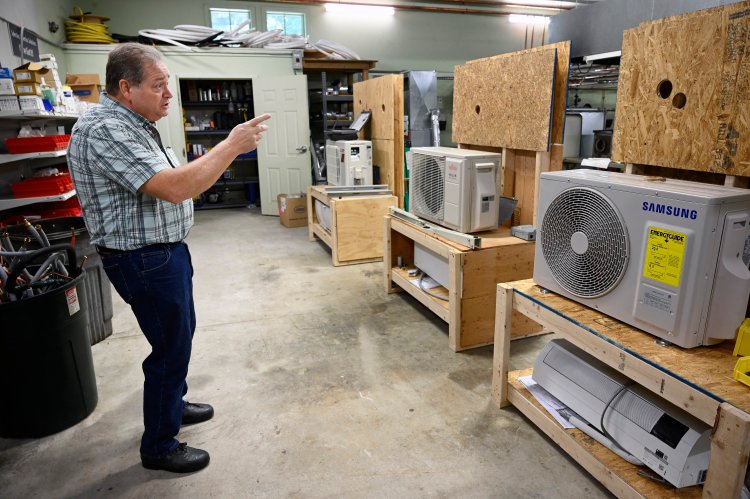

Roger Mitchell, dean of the Maine Energy Marketers Association’s Technical Education Center, speaks about heat pump training at the Brunswick facility on Thursday. Shawn Patrick Ouellette/Staff Photographer
The state of Maine’s ambitious efforts to expand the use of heat pumps to reduce carbon emissions from buildings are outstripping the supply of technicians needed to install and repair the equipment.
Gretchen Larman of Yarmouth said she waited about six weeks this summer for her electric heat pump, which was leaking coolant, to be repaired, leaving her without air conditioning during occasional heat waves.
“July without anything is very long,” she said.
When she looked for a repair service, she was told she would have to wait weeks. She often received a similar message: “We are so overwhelmed. This is the best we can do.”
Employers and schools say they cannot train enough heat pump technicians.
While about 2,510 people worked in heating, ventilation and air conditioning (HVAC) jobs in Maine in 2020, that number is expected to drop to 2,350 by 2030, according to a database sponsored by the U.S. Department of Labor.
Last year, Maine was already below that estimate; according to the state Department of Labor, nearly 2,100 people worked in these occupations at that time.
Yet the number of heat pumps installed in Maine has more than doubled, from fewer than 50,000 a few years ago to 100,000 in July 2023, two years ahead of Governor Janet Mills’ planned goals. She has set a goal of installing an additional 175,000 heat pumps in Maine by 2027, bringing the total to 320,000 when the goal is reached.
Scott Libby, owner of Royal River Heat Pumps in Freeport, questions that goal. “Our capacity is limited,” he says.
An ageing workforce
Libby said the aging workforce in Maine, which is affecting most industries, is partly to blame for the shortage of HVAC technicians. In the U.S., as many as 10,000 baby boomers turn 65 every day, and the youngest members of that generation will turn 60 this year. As they retire, jobs are becoming empty.
Adults ages 65 and older make up 9.4% of Maine’s workforce, compared to 6.6% statewide.
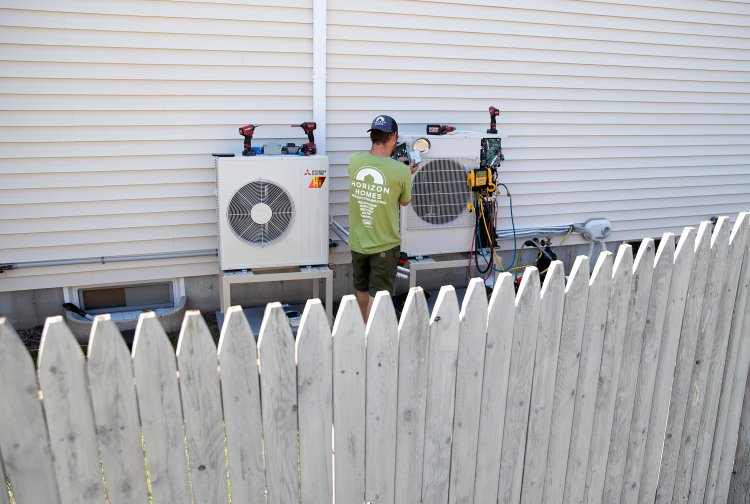

Brandon Stinchfield, senior technician at Horizon Homes, installs heat pumps at Homestead Village in Westbrook on Thursday. Derek Davis/Staff Photographer
The pandemic also made the situation worse, as production stoppages affected supply chains.
“The onset of COVID has only reinforced it,” Libby said. “It’s been outdated for years.”
The average age of HVAC professionals is about 54, according to the Northeast Technical Institute (NTI), which states that “a significant number of HVAC technicians will retire within the next decade.” The institute trains workers for HVAC, healthcare, and other industries in Maine.
The need for workers will only continue to grow. Mills announced in July that the state of Maine would receive between $45 million and $72 million from Washington to install more electric heat pumps. Efficiency Maine, the quasi-governmental agency that administers energy efficiency programs, estimates that with a $42 million budget, it could convert about 7,750 homes from fossil fuels to heating and cooling entirely with heat pumps.
A typical home will be equipped with one to four heat pumps, depending on size, condition and floor plan, Efficiency Maine said.
WHERE ARE THE TRAINING COURSES?
HVAC training comes in a variety of formats, including longer courses and shorter courses that lead to certification.
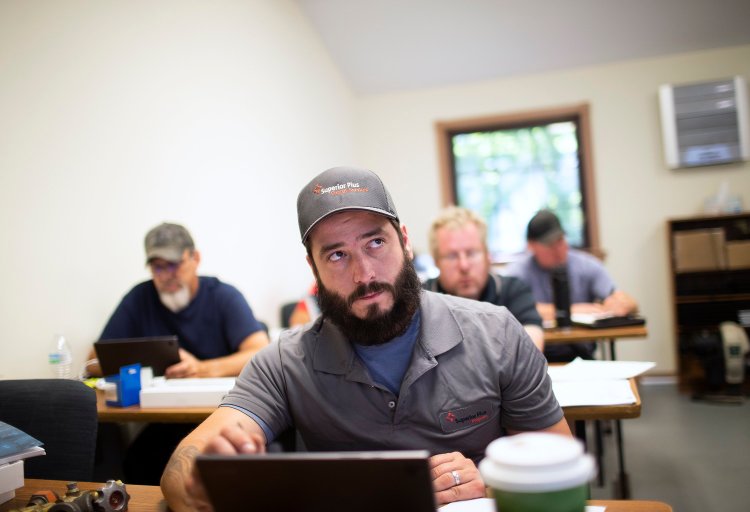

Chris Sorois listens as Roger Mitchell teaches a class Monday at the Maine Energy Marketers Association’s Technical Education Center in Brunswick. The center is offering a 40-hour training course on heat pumps later this month and again in October. Derek Davis/Staff Photographer
Welcome Richardson, an HVAC instructor at NTI, said students with training in heat pumps, gas and oil heating and air conditioning – a seven-month program – often find a job the day they graduate.
“Everyone is looking for employees,” he said. “People with training in heat pumps, gas, oil and air conditioning are hard to find.”
“People who work in the trades, especially in the heating, ventilation and air conditioning sector, earn a lot of money. Many people may not even know that,” says Richardson.
At its Technical Education Center in Brunswick, the Maine Energy Marketers Association trains HVAC workers in the classroom and in a lab where equipment is broken and repaired. The center has offered six or seven courses a year for five years, with about 20 students attending each course, said Dean Roger Mitchell.
The reason for this is a demand that, according to him, is “quite stable”.
A 40-hour, week-long course leads to certification and registration as a supplier with Efficiency Maine. Courses cover sales, installation, repair and other skills. Students are recommended by their employers, by word of mouth or the result of an online search, and by military veterans, Mitchell said.
WANTED: WORKER WITH MECHANICAL SKILLS
Libby, of Royal River Heat Pumps, employs about 30 installers, including seven licensed electricians. “I could hire 10 if I had the right 10,” he said.
He said starting pay is $30 an hour and will increase to $40 an hour over time. It pays 100% of health and dental insurance and offers a 401(k) retirement plan and flexible hours.
“I really don’t know how to make it more appealing,” he said.
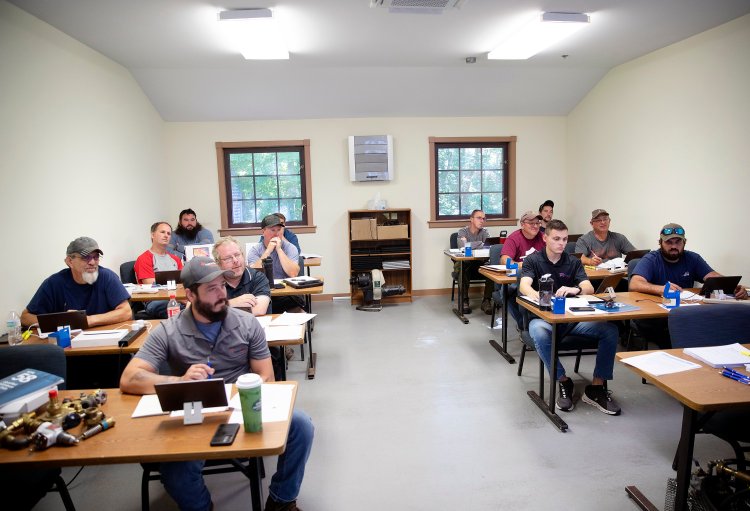

Students listen as Roger Mitchell teaches a class on refrigeration systems at the Maine Energy Marketers Association’s Technical Education Center in Brunswick on Monday. The center recommends students take the class before enrolling in the 40-hour heat pump training course. Derek Davis/Staff Photographer
His employees include former carpenters and car mechanics with a certain level of technical skill. “It’s really nice work. It’s relatively clean. You don’t go home covered in grease and soot.”
Libby said he usually finds coworkers among his employees who tell friends and former colleagues.
“One employee is responsible for three others,” he said. “They built jeeps and SUVs together, drove them through the woods, broke them and fixed them. Word of mouth is the best.”
Heat pumps extract heat from outside air and pass it through a compressor that warms it before pumping it inside a building. In the summer, they can also work in reverse, pulling heat from inside a building and pumping it outside to cool interior spaces. As state and federal agencies set increasingly stringent greenhouse gas emissions targets, buildings — and their use of natural gas or oil for heating and cooling — are being redesigned or retrofitted to improve energy efficiency and accommodate electric heat pumps.
Because of the scale, policymakers and environmentalists are targeting emissions from buildings: According to the U.S. Energy Information Administration, residential and commercial buildings last year consumed about 28 percent of total U.S. final energy—that is, the energy used directly by homes, buildings, vehicles and industrial applications.
RAPID EMPLOYMENT GROWTH EXPECTED
According to the U.S. Department of Labor, employment of heating, air conditioning, and refrigeration mechanics and installers is expected to grow 6% nationwide between 2022 and 2032, faster than the average for all occupations.
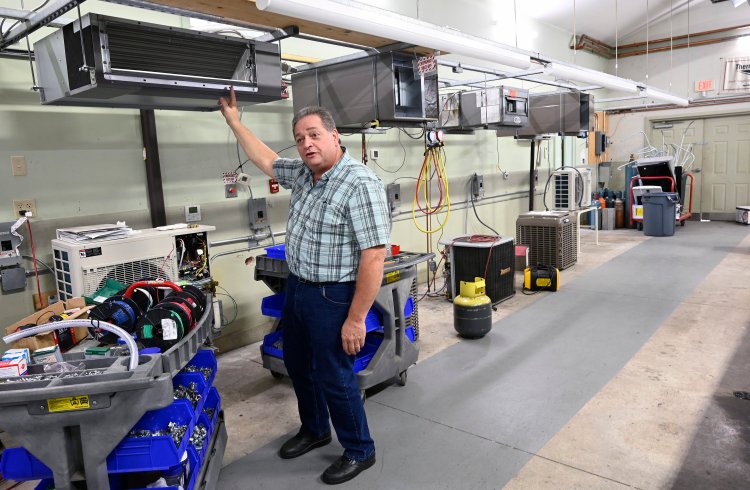

Roger Mitchell, dean of the Maine Energy Marketers Association’s Technical Education Center, speaks about heat pump training at the Brunswick facility on Thursday. Shawn Patrick Ouellette/Staff Photographer
According to the federal government, an average of about 37,700 job openings for heating, air conditioning and refrigeration mechanics and installers are forecast each year over the course of the decade.
Many of the vacancies, which had an average salary of $57,300 last year, are expected to be filled by the need for replacement workers who are changing careers or leaving the labor market, such as through retirement, the Labor Department said.
In Maine, the average annual salary for heating, ventilation, and air conditioning jobs is $59,000.
Pressure to hire heat pump technicians is mounting. The U.S. Climate Alliance, a coalition of 25 governors, announced in September 2023 that members had agreed to install 20 million heat pumps by 2030.
Government subsidies are boosting demand. Federal and state subsidies amount to up to $10,600 for the installation of a heat pump. Efficiency Maine offers rebates of up to $8,000, which subsidize between 40 and 80 percent of the project costs, depending on income.
In addition, federal tax credits of up to $2,600 are available.
And money from Washington is being used for green energy job training. Portland Adult Education, for example, received $416,179 for its pre-renewable energy training and other programs by adding training focused on heat pumps and thermal engineering. The school plans to use the funds to prepare up to 150 people for jobs in the clean energy industry.
In total, six programs will share $2 million: Maine Math and Science Alliance in Augusta, Biddeford School Department and Biddeford Adult Education, Oxford Hills and Nezinscot Adult Education, PassivhausMaine in Freeport, Portland Adult Education and the University of Maine in Orono.
Larman said it’s confusing how difficult it is to get repair service.
“We build huge things to install, but we don’t have the staff to maintain those units,” she said.
Copy the story link

